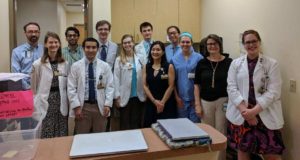Shade Tree Clinic: An opportunity for community service that drives MSTP professional development
Shade Tree Clinic (STC), which currently provides free, comprehensive healthcare to approximately 350 patients in and around Nashville, has served to inspire and train medical students and MSTP students alike since its founding in 2004. Among the countless MSTP students who have served in leadership positions, a healthy majority (9/12) of those queried were enthusiastic to share what they learned and how STC has shaped them and their career path moving forwards. You can view the complete responses from MSTP students here.
Through the years, STC has provided opportunities for MSTP students to refine and hone their leadership abilities. Matt Stier (M4), former STC Executive Director, notes that, “leadership and management are such a critical part of the success of physician-scientists, who are tasked with setting their research mission leading both investigative and clinical teams…Even 5+ years removed from my time [at STC], I still regularly rely on the skills I developed as Executive Director to help advance my training and career.” Jack Walker (G3), former Dispensary Director, elaborated that, “I learned a ton about leadership and management, including things like managing supplies, people, and a budget which I think will be incredibly helpful when I hopefully run a lab myself in the future!”
Paula Smith, MD (G2), the Executive Director who guided the clinic’s transition from a mobile trailer to the location on Dickerson Pike, explains that her experiences with the clinic, “…led me to a career in surgery, which may sound counterintuitive but it’s true. One of the things I enjoyed most about STC was the opportunity to make tangible and permanent changes in patients’ lives, which I think is something that we get a lot of in surgical specialties.”
In addition to executive leadership roles, MSTP students have been involved as sub-specialty directors, allowing them to appreciate their future role as physician-scientists and stay abreast of the clinical information that will help them in residency. Sumeeth Jonathan (G4), Neurology Clinic Director, explains how his experience at STC, “has given [him] an appreciation for not only how debilitating neuropsychiatric symptoms can be, but also how immensely rewarding it is when steps are taken towards their appropriate management.” Furthermore, his STC experience has, “…all but validated [his] decision to pursue a career in academic medicine.” Kelsey McNew (G2), Gynecology Clinic Director, describes how “one of the unexpected benefits was that I’ve developed relationships with many faculty members and fellows in OB/Gyn.” She also notes that, as MSTPs, “we also can serve an important role in clinic leadership because we see what happens from year to year, and are able to serve in a longitudinal capacity.”
Students also remarked on the utility of STC during their PhD years as a means of feeling connected to patient care, reinforcing their motivation to pursue science, and experiencing the ups and downs of longitudinal patient care. J-N Gallant (M4), former Dispensary Director, notes, “It’s been fantastic to return to clinic, now a few years later, as a clinical student taking the STC Advanced Clinical Elective and having patients recognize me.” Nick Harris (M3), a former Executive Director, explains how interaction with patients at STC helped formulate his research and clinical interests: ““…I observed the grossly unmet need of mental healthcare, specifically in the context of stressful life events and substance abuse.” Furthermore, STC uniquely provides an opportunity for us to see our peers take steps that have a positive impact on our patients. As Duncan Smart (G1), current Director of Laboratory Services, notes, “…it’s really the only place that you get to see your peers in action. Students are drawing labs, suggesting changes, offering resources, dispensing medications, and scheduling visits. It’s real student-delivered healthcare (with guidance [from Drs. Miller, Fowler, and Weaver] of course).”
Through our exposure at STC, MSTP students learn to navigate, and once in a while conquer, the convoluted healthcare system where most of us will one day practice. Eileen Shiuan, former Pharmacy Assistance Program (PAP) Director, explains how her role at STC showed her, “…the socioeconomic impact of Tennessee’s decision to not expand Medicaid (Tenncare)…”, while simultaneously “being able to provide our patients with the medications they need to improve their health…” such as through the Harvoni initiative, where the PAP program has “… treated and seen sustained virologic responses in 10 patients thus far at no cost (retail value of close to $1 million).”
Since its founding, STC has provided a fertile ground for learning and discovery. It has allowed MSTP students to take ownership of projects that have real, tangible impacts on patients’ lives. Through our engagement as preclinical and clinical volunteers, staff members, and subspecialty, department, and executive directors, MSTP students have learned skills that will serve us as we progress in our careers. We have learned how to lead teams of people, navigate complex micro- and macro-systems, and provide compassionate, comprehensive care to our community. Among those that have been deeply engaged with STC, it continues to define the type of physician-scientists that we aspire to be.
To learn more about Shade Tree Clinic, click here.
